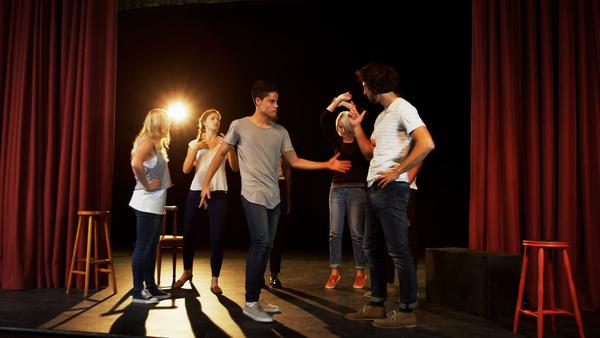This is one of the most common questions that newbies obsess over, but is it really a factor to begin with? The thing is, the answer to the question speaks to more than just simply holding the script. Find out whether holding the script in the audition room really bothers the casting panel or not.
To Hold the Script or Not: Do Casting Directors Really Care?
 youtube
youtubeAuditions come in various forms.
For those of you who have gone to a few auditions, you may have found cold reading and the prepared audition to be the most common way of auditioning. While they are indeed the usual ways to showcase your acting chops in auditions, there are also other audition methods you should be aware of. Oftentimes, the panel uses more than one type of audition. Cold reading particularly involves reading an excerpt of the script, which you have never seen or read before. You then perform based on your immediate understanding of the scene and lines and the situation explained by the director. The goal of this audition is to see how you perform when your are thrown into an unexpected situation and how you instinctively react to a story without a chance to prepare.
Another type of audition is the prepared audition, which involves delivering a monologue. The piece can be from a manuscript or printed play. Sometimes the directors may ask the actor to repeat the monologue at the audition, with a specific direction (e.g., try reciting the monologue as if the character is insane). The goal of this audition is to see how actors prepare and if they can take direction.
 bramongarciabraun
bramongarciabraunThere are productions that will ask you to rehearse a scene from the project you are auditioning for. In this type of audition, you will be given scenes from the play or film and time to rehearse the scenes before presenting. The goal of this audition is to give you a chance to prepare and see what you bring to the scene. Rehearsed scenes also give the casting panel a better view of how you can work with other actors.
Now let’s go back to holding the script. When asked to cold read on short notice, everyone auditioning is left with no choice but to hold the script. It’s termed cold reading for a reason. If the sides were provided days before (as in rehearsed scenes), chances are there may be last-minute changes in lines and on-the-spot direction. That means you’ll still have to hold the script to deliver these changes. For prepared auditions and rehearsed scenes, casting directors are almost immune to actors holding sides, as long as they are held skillfully and only referred to when necessary. They would rather have the actor refer to the sides if they forgot a line than panic, freeze, and then ask to start all over again. That would have wasted their time.
It’s a work in progress.
 nycastings
nycastingsDirectors recognize that creating stories is a collaborative process. While the casting panel wants you to come into the room and do your work at the highest level, holding your pages solidifies that you all are in the early stages of your collaboration, that this is still your initial take on it, that you are all still discovering what works and what doesn’t, and that you’re available and open to direction. It also allows everyone to relax, knowing you have your pages if you need them should changes be suggested. This is not the final take. Casting director Paul Weber says, “Ideally, it would be preferable to have the material down cold on the initial audition, however perfectly it’s fine—even preferable—to have the sides in your hand. Remember you are giving a [hopefully] great audition, not a finished performance.”
Casting directors aren’t expecting actors to turn up—often on extremely short notice—completely off-book. It just isn’t feasible for a busy actor to fully memorize sides for every single audition they go on, especially if they only get the audition notice the day before or even the same day as the audition.
What about “stage” presence?
 dissolve
dissolveWhich do you think is worse? Believing that you are finally off-book then forgetting a line but with the script in hand? Or believing that you are off-book then forgetting a line but without the script in hand? The sense of reassurance you get from just having the script takes away the stress of making sure you’re 100 percent off-book. Besides, having memorized every word does not guarantee a great experience for everyone.
And one more thing, off-book does not necessarily mean sides-free. Let’s assume you’re already confident about the entire material and have experimented on various acting approaches beforehand (doesn’t really happen). Holding the script without glancing at it is still totally fine! Would it negate your presence from the audition room? Not at all.
Conclusion
Remember, the signs of preparedness can be seen in your eyes, delivery, and confidence. These are not present in whether you’re holding the pages or not. Director Doug Stapleton says, “What I am looking for is how an actor has interpreted the character in relationship to the other characters in the piece, and of course, the subtext. I would much rather see an actor hold sides and give me a true performance from their perspective versus having someone just spew the lines they have memorized. I want to see a performance not how well someone has memorized lines.”